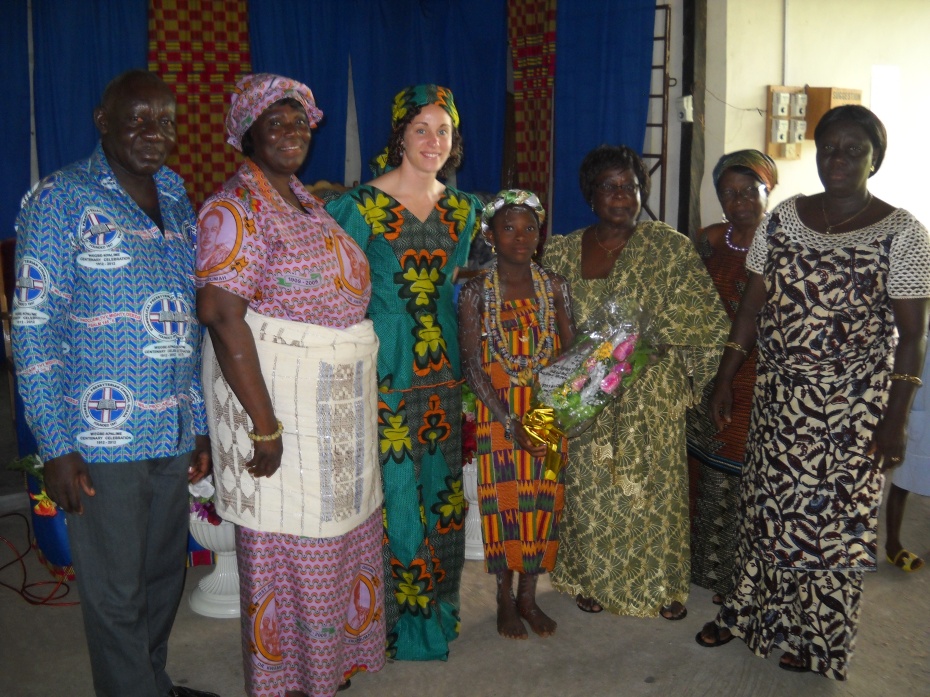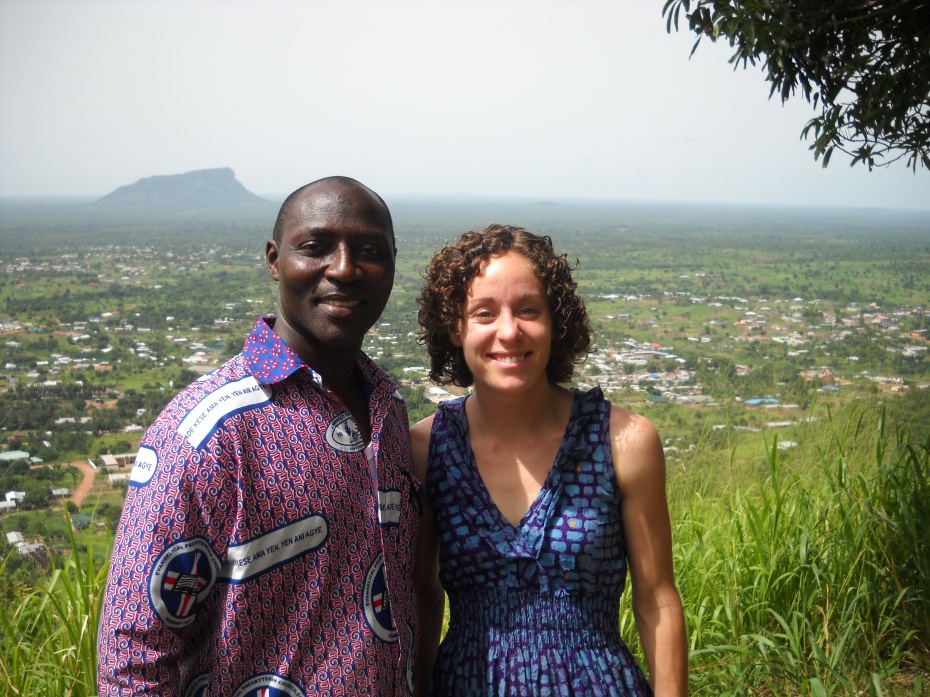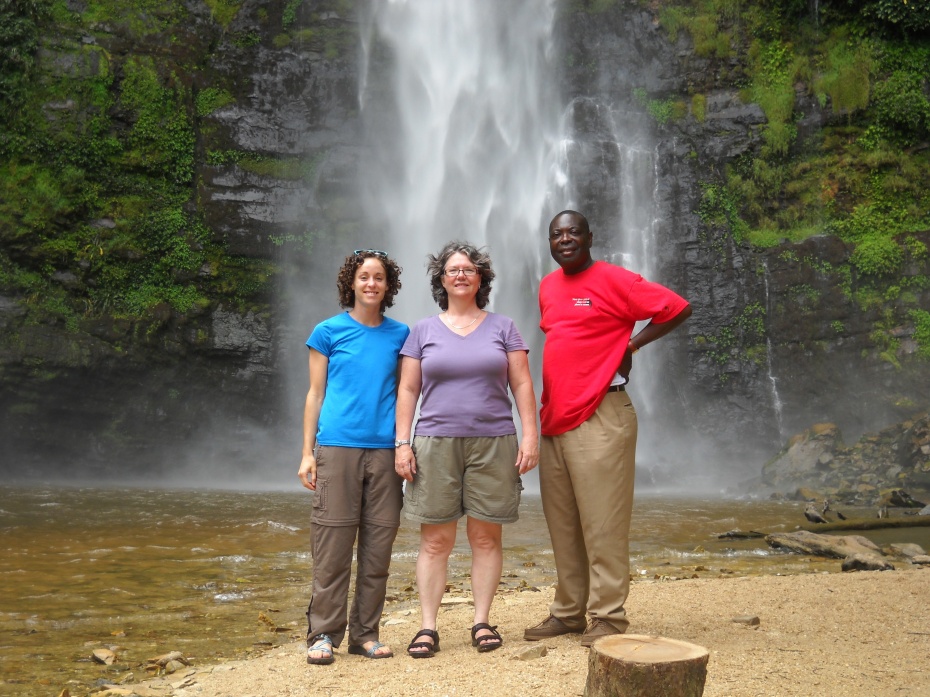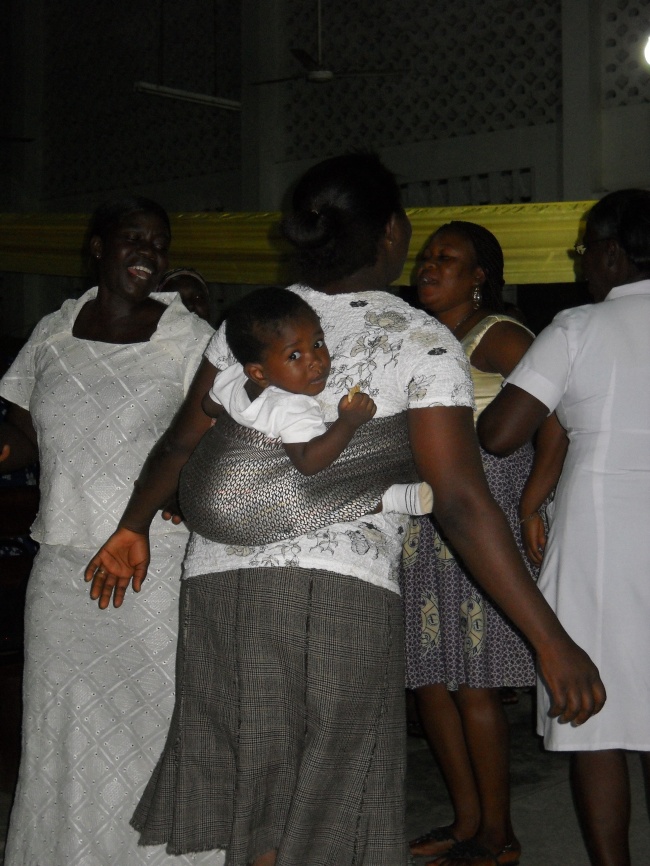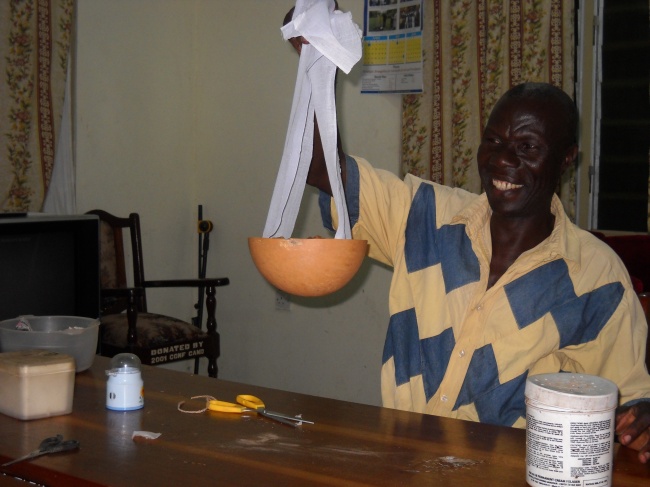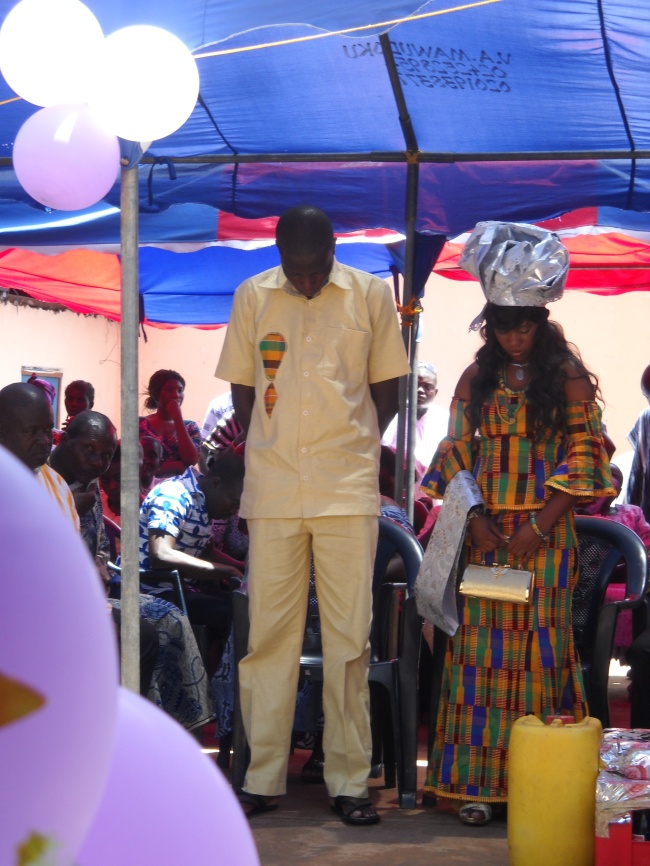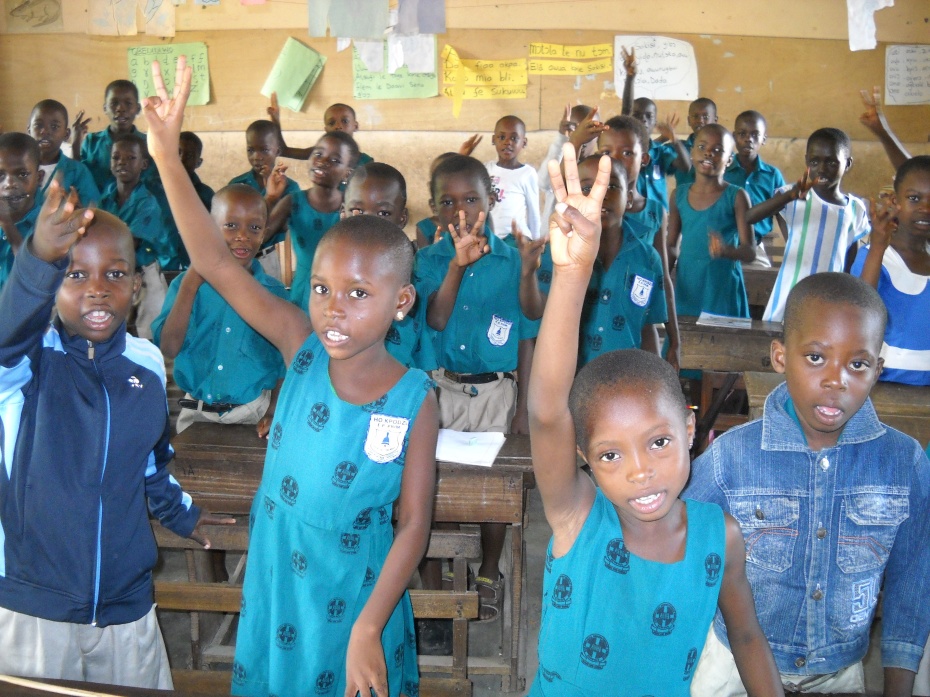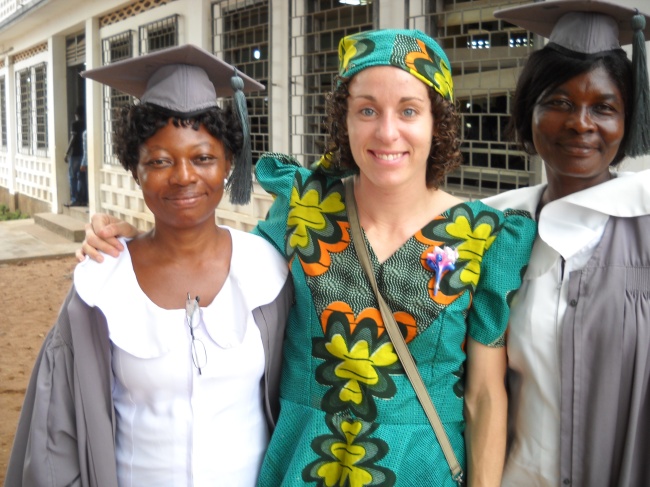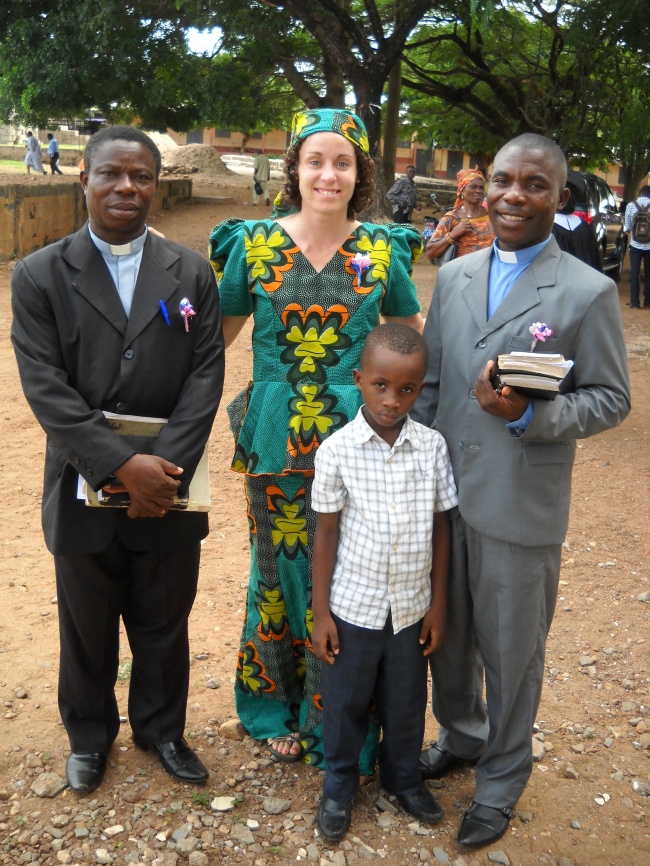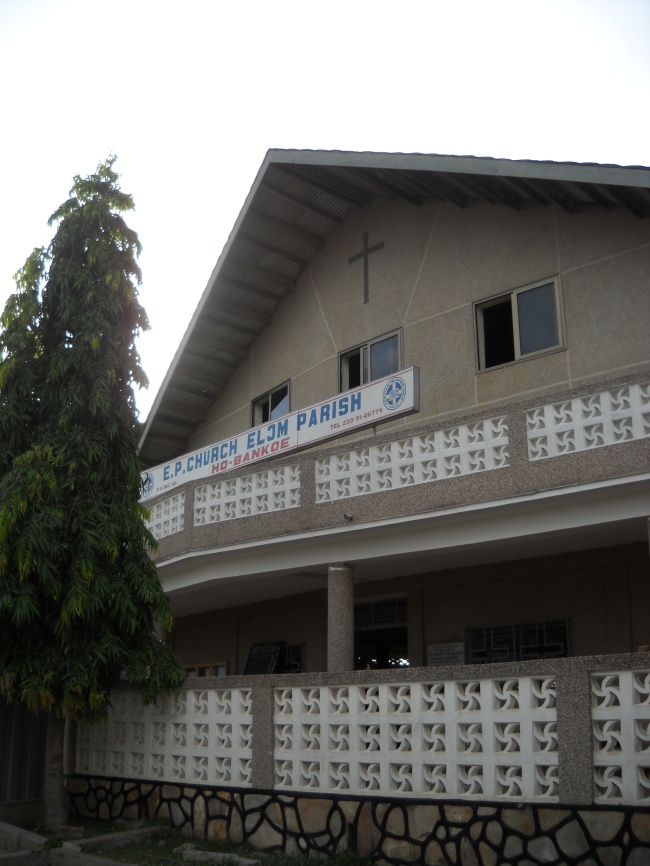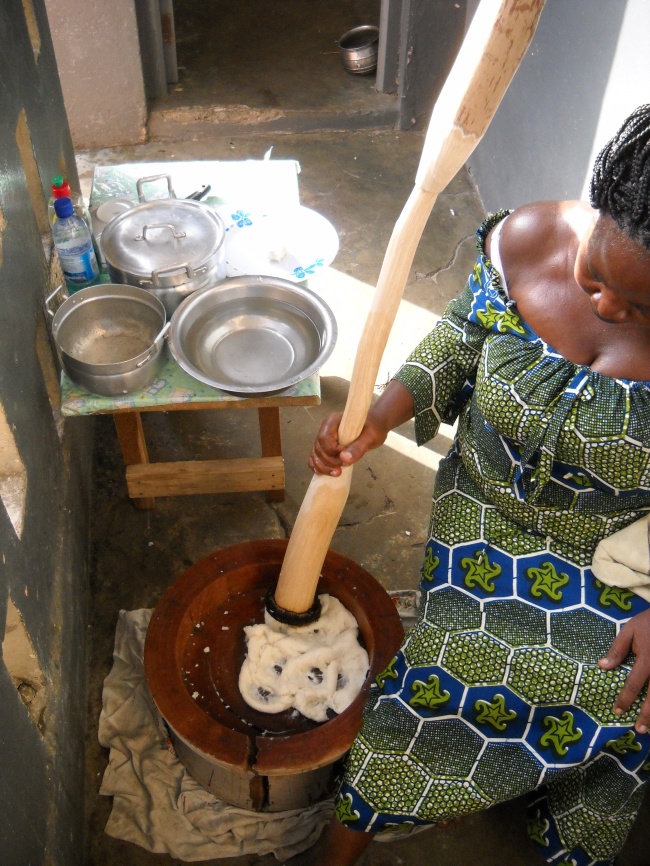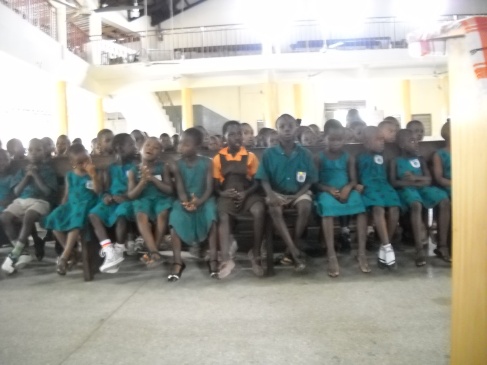Sunday was my final Sunday in Ghana and now I am only a few short days from departing this beautiful country. It was an amazing day for sure. My host pastor for the past three weeks has been Rev. Vincent Dagadu who is the Youth Programs director for the E.P. Church and also the pastor of a small congregation in Ho, Mawuli Estate. I have been attending church with him and interacting with the church members for about three weeks now. This Sunday especially was a beautiful celebration of my time in Ghana. The congregation may be small but this church and its members impressed me more than any others. When you worship with Mawuli Estate the joy is contagious. This Sunday I finally felt myself lay aside all of my insecurities about being a white lady in an African church, I felt the Spirit move in and lead me on. This time when I was dancing with the music and with the ladies of the congregation I no longer felt awkward but just part of the church family. I have felt welcomed and loved during my entire stay here but there was something different about this time, place and group of people. There was no way you could have ignored the Spirit moving in this place and be wrapped up in all the joy that is flowing through the people. One of my favorite practices of this congregation is their version of the “passing of the peace.” Their version involves the church band playing music and singing and the entire congregation (including the pastors) singing, dancing and walking around and shaking hands with everyone. This Sunday I was also invited to be the preacher for the day (sermon is below). As I usually am before delivering a sermon I was quite nervous and unsure of the message I had prepared, but as the scriptures were read and the choir sang before my sermon I said prayers to God and asked God to be at work. I also sang a hymn in the local language of Ewe as my prayer before the sermon. Rev. Dagadu taught me the song and sang it along with me. It was such a beautiful moment singing about God’s love that never ends. It had Vincent and I and the entire congregation smiling from ear to ear! The sermon experience was amazing as well, especially when I could tell the congregation was even understanding my English (based on there “amens” and other affirmative comments). As I preached about being one in Christ I could sense that we were all one in that very moment. It really is incredible what can happen when you step aside and let God move and work in your midst. I think we are in trouble the moment we stop relying on God and rely only on ourselves to bring the Word, to transform, to heal etc..we are in big trouble if we think that we are the ones that hold the power!
After my sermon the congregation presented me with several gifts. One small gift would have been typical, but this small congregation showered me with gifts. They presented me with a large piece of Kente cloth (woven fabric, traditional in this area). It was not just one strip but over 10 sewn together, enough to make a full outfit. To put this in perspective, this is a very expensive gift and would be considered the nicest type of cloth anyone in Ghana could wear. Then they presented me with two cakes, one that was iced with my name written on it and a goodbye message from the church and another that was wrapped for me to take with me. I cut the cake together with the church elders and the entire congregation partook in the delicious cake (it was similar to banana bread but more like cake + icing). I was overwhelmed with gratitude! Of course the gifts are wonderful but those only stand as symbols of the relationships we have formed, the time we have shared together and how grateful we all are to now be acquainted as brothers and sisters in Christ. What a special, special day. I am beyond grateful to God for all the members of Mawuli Estate who showed me that the love of Christ, when truly displayed, has no bounds. I will never be able to express how deeply touched I have been by all those I have met here in Ghana. I am certain that many here will continue to be my friends, colleagues and brothers and sisters for life. So often we go to other countries or any unfamiliar place with our own agendas, but I came here to Ghana because I felt God was calling me back. Mostly I had no idea who I would meet and what would fill my days. I am so glad that I had no agenda except to learn, experience and form relationships. As soon as I departed, I stepped aside and I have been truly amazed by all that God has shown me and all of the ways I have connected with God alongside the people of Ghana. By coming with no agenda and being completely open to what ever life would bring, I have seen that that has allowed God to be at work equally among myself and my friends here in Ghana. It is not just me who has received blessing in this. My friends and I here are equally honored to call each other partners, friends, colleagues and brothers/sisters. Thanks be to God (Akpe na Mawu)!
Sermon: Christ has set us free to serve
Mawuli Estate Congregation
June 23, 2013
Allysen Schaaf
Scripture passages:
1 Kings 19:1-7
Luke 8:26-29
Galatians 3:23-29
The theme for today’s sermon is supposed to be “Christ shall set you free,” while there are still many things we may wish Christ to free us from, I believe that Christ has already set us free. But does this mean we are free to run around anywhere we want, acting how ever we want with no fear of the consequences? Does it mean we are free from judgment or from the responsibility of living lives as children of God? I don’t think so. In dying on the cross, Christ reconciled us to God, forgave the sins of the world and set us free from the ancient laws the Jews once followed. Christ overcame death so that we might have life. I believe that Christ has set us free in this way for a purpose though. So I’d like to add to today’s theme a little and say that Christ has set us free to serve.
When people encounter God, they cannot remain the same or stay in the same place, they are compelled to go out and serve and share what God has done. We can see in our three scripture readings for today. In the text from 1 Kings, Elijah fears for his life and asks to be dead rather than continue to flee, but God provides food for him, enough food for him to travel 40 days and 40 nights. Even after this when Elijah wants to flee, the Lord sends him back. It seems Elijah’s time as a prophet is not over. In Elijah’s encounter with God he is strengthened and fed and sent out to continue his prophetic work, his work of serving the Lord.
In our text from Luke, Jesus cures a man who had been possessed by demons. After the man is free from the demons, he wants to stay with Jesus, but Jesus says to him, “Return home and tell how much God has done for you.” So the man went away and told all around town, all that Jesus had done for him (v. 39). Again, an encounter with the living God, who feeds, heals and transforms, does not allow a person to stay the same. An encounter with God does not allow a person to stay in the same place. In both of these stories the men who encounter God are compelled to continue on their journeys and proclaim God’s mighty deeds to others. They are compelled to serve God, each in their own way.
Then we hear in Galatians how all people are now free from the law and that all are one in Christ Jesus. They are set free from all of the boundaries that previously kept them apart- their gender, ethnicity, their wealth or lack of it- in order to be one in Christ as children of God. At the time of this letter, there were many disagreements between the Jews and Greeks who were joining the Christian church. Paul saw how these divisions threatened to tear Christ’s church apart and so he urged the people to be one. I think he knew the church would better be able to fulfill God’s mission if they all worked together.
What great freedom and promise we have received from God that we should be called children of God and heirs of God’s promise. We could be tempted to proclaim this good news, close our Bibles and go home, but as I have already stated, I believe Christ has set us free for a reason. Christ has set us free and made us one not just so we can look around and smile at each other and know that despite our differences, we are one. We are freed by Christ in order to more fully serve and praise the Lord all our days.
We hear in Galatians that there is neither Jew or Greek, slave or free, male or female, but I’m afraid this is not the picture we see in our world today. There are so many ways that we let our nationality or our tribe divide us. Just one look at the international news tells us that we have problems with this everywhere around the globe. North and South Korea, Palestine and Israel, Christians and Muslims fighting in the Middle East and Africa.
In Christ there is neither slave or free, but how many child slaves and child workers still exist? So many. We know that child trafficking is an issue here in Ghana, especially in the fishing communities and Ghana is not the only country where this type of slavery still occurs. Many others are enslaved under poverty, living under a corrupt government or under and economy or justice system that seems to do nothing to free them from their poverty. In the US we too have a lot of poverty scattered across our nation. In our Nation’s capital, Washington, D.C., in this city alone there are around 10,000 homeless persons. This includes men, women and children.
In Christ there is neither male or female, but how often do we left our gender tell us that we are better or that we are inferior to another? So often we hear of women being abused by their husbands or earning less than men at the very same job, even if they have the same level of qualifications.
We can look at our world, our communities and our churches and see that in many ways we have not fulfilled our oneness. Of course there are many things we do to support each other and unite in the name of Christ, but there are still many ways in which we fall short. It is like we have been set free by Christ but we are still sitting in the opened jail cell.
We have been freed so that we can all live as partners, as brothers and sisters, who work together to make this world a place where God’s love is realized for all. We are set free to make this world a place where no one lives in slavery, poverty or abuse but where all live and work in such a way that we show that we are truly one in Christ. Each Sunday we enter the chapel to worship and praise God and to hear God’s word proclaimed. Yet, just like the man in Luke who was healed of his demons, we are not called to stay here, we are called to go out and share all that God has done for us. We are called to respond to the word we hear through serving our neighbors and promoting unity. Brothers and sisters, we have heard the radical good news today- for in Christ Jesus you are all children of God through faith. How can we not be stirred, changed and moved to go out into the world and share this…to live this out?
All of this I believe is supported by the prayer we pray every Sunday, the Lord’s Prayer. In the gospel of Matthew, The Lord’s Prayer is given in the context of the Sermon on the Mount. It could seem like this prayer is a secret message for just the disciples but at the end of Jesus’ sermon we hear that the crowds were amazed. So this was a message and a prayer for ALL! This is a prayer for all who follow Christ and for all those who have not joined in following him yet. Every Sunday we stand and pray the Lord’s Prayer together in one voice. But I wonder if sometimes we just say the words without contemplating their meaning or considering the millions of others around the globe who also pray this very same prayer? The Lord’s Prayer is I think one of the greatest examples of this unity we share in Christ. As millions of believers around the world recite the prayer that Jesus taught us, we share in fellowship and unity. Even if we say the prayer in a different language or in different church settings…this prayer unites us all.
This prayer also calls us to think about the needs of others and of what God’s will for the world is. After all, this prayer does not say..let my will be done, give me bread, forgive me, bring my kingdom here to earth. No, rather this prayer says our father, thy kingdom come, thy will be done, emphasizing that it is never our own humans desires that we pray for but for God’s heavenly kingdom to be fulfilled here on earth. And we don’t just pray for our own needs to be met, we pray give US this day our daily bread, and forgive US, as WE forgive, lead US not into temptation, deliver US from evil. The plural language of this prayer pushes us to knock down all the barriers we may have unknowingly put up around this prayer. This prayer is not just for you or for me, it is not just for men or just women, it is not just for Presbyterians or just for Methodists, it is for all who are now called children of God through Christ Jesus.
When Galatians says in Christ there is neither Jew nor Greek, slave nor free, male nor female, it is true we are all one in Christ. Others around Ho, around Ghana, around the continent of Africa raise up the Lord’s Prayer just as we do here at Mawuli Estate. Believers in Europe, America, Asia, South America, Australia, and Antarctica pray the Lord’s Prayer. Presbyterians, Methodists, Catholics, Christians of the EP Church, PCG, world evangelical church, the charismatic churches…people around the globe pray this prayer. So what if when we prayed this prayer we not only thought of ourselves and our church but of all the others who also pray this prayer? Then we would be praying for the needs of all of God’s children and they would be praying for us. Brothers and sisters, this is the unity that we are talking about when it says all are one in Christ.
Further, Musa Dube, a biblical scholar from Botswana writes that “to pray the Lord’s Prayer as Christian practitioners, therefore, is to pledge responsibility to being active partners in the building of the kingdom of God on earth.” When we pray the Lord’s Prayer, we not only pray for all of God’s people we also commit to working to bring God’s kingdom here to earth for everyone.
So what might this look like? What would it look like if we all saw one thing in our community that did not resemble God’s kingdom and God’s promises of life and grace..what if we saw one such situation and did something to change it? Maybe we would speak out against child trafficking and child labor that continues to go on here in Ghana and elsewhere around the world. Maybe we would take the time to visit the sick and elderly of our congregation. Perhaps our singing group, men’s or women’s fellowship or CYB would decide together on a need in the community they would like to try and get more involved with.
Think of the needs in this country, in this community…and think of your gifts. I know so many of you have the gift of song and dance, the gift of hospitality and friendship, the gift of a mango or maize that you have grown, the gift of a tithe or your physical labor. Maybe you could go to one of the Shepherd centers for the aged and bring them the gift of your songs and in turn fill them with joy and unite with your elder brothers and sisters who are so often left lonely and neglected in their homes. Perhaps this church would decide together on an agency to support in this community, like the youth rehabilitation center for street children, a health clinic, or any of the other organizations here in Ho working to bring God’s love to others. Perhaps the church might choose one of these and decide to pledge a certain amount of the offerings each month to this organization so these organizations could continue their ministry to the community. Or maybe you yourself could go and volunteer at one of such organizations. The possibilities are endless.
Brothers and sisters, there are so many ways we do live out this calling to serve others and live as one body of Christ. I have experienced much of this while I have been here, whether it was in being pulled into your dance circles, being invited to your homes for a meal or just in the way you have accepted me as a sister in Christ. But we know that this chapel, nor even the largest chapel in the world, could ever hold all of God’s children. So, we know there are many out there who we are to serve and share the Good news and joy we have experienced here. We have indeed been set free by Christ, set free to serve. I pray that God would continue to bless you this day and that God might challenge each of us to find one way we can serve others and show with our lives that we believe we are all one. As I depart this week, I will continue to keep you in my prayers and I hope you will pray for me, so that God might use all of us to bring God’s kingdom here to earth. Each time I pray the Lord’s Prayer I will think of Mawuli Estate congregation and I will think of all others around the world who pray this prayer. My prayer is that you will do this same and that together, we might serve our God and serve our neighbors, showing that we believe: we are all one in Christ Jesus. Amen.

